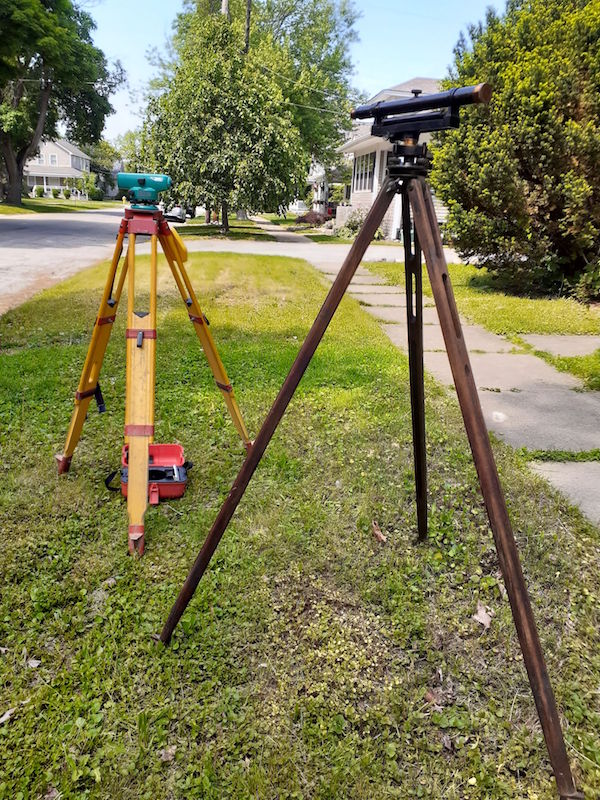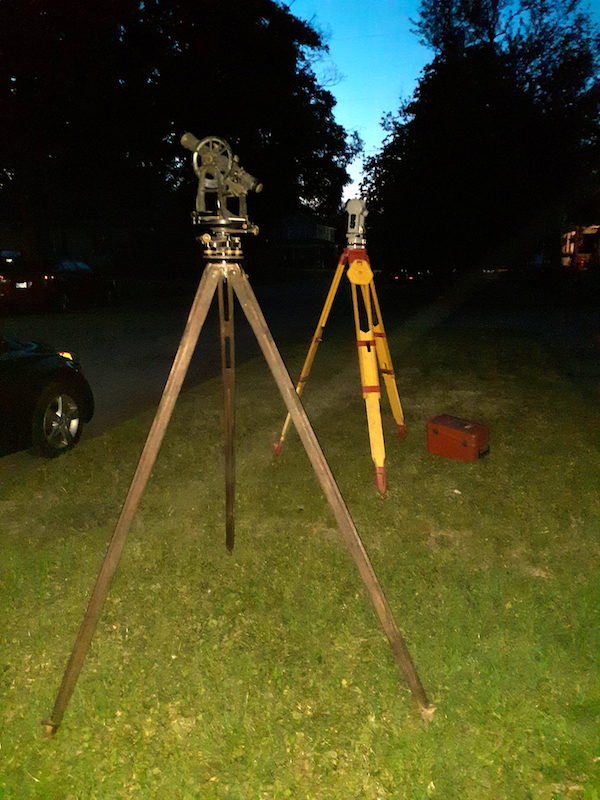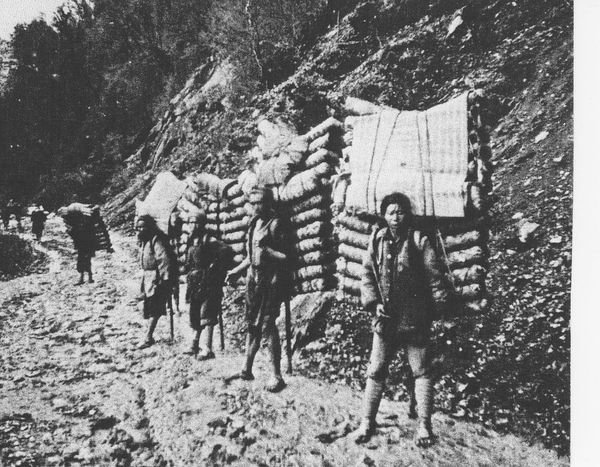
The new one is in the background - it's not as attractive as the antique in the foreground, but it's much more useful.
*Post-Apocalyptic Employment*
By: GVI
30 May 2023
A week or so ago I reached a preparedness milestone I've been working on for so long I didn't realize I'd done so until some time later.
What happened was I bought an automatic level. An "auto-level" is a surveying instrument that measures elevations, and it does this with the same accuracy, only quicker and with much less fiddling around, than its older sibling the "dumpy level" or even older "wye level."

The new one is in the background - it's not as attractive as the antique in the foreground, but it's much more useful.
This was significant because it's the last instrument I needed in order to do everything a land surveyor can be called upon to do in our area, and I can do it all without electricity or modern technology. I've already got a "theodolite" or transit, good steel tapes, range poles, level rods, calculating aids, a drafting table and instruments, and everything else needed to do my job by daylight or flashlight if need be. The auto-level was the last piece of the puzzle.

There's more to surveying than just the instruments, but pulling everything out for a photo shoot isn't the point of this essay.
I've been a surveyor since the late 80s and first learned my profession in the military. Many of the capabilities and skills I learned at the Fort Sill Field Artillery School - such as using astronomy, calculating via log tables and so on - are functionally obsolete in the modern world. But I keep the old skills relatively current for a number of reasons:
This last bullet point bears a bit of explaining.
There is a vast span of belief as to what "TSHTF" looks like. Most of us - many Rubies of long-standing included - hold to a mental picture similar to that seen in the "Mad Max" movies or perhaps in cyberpunk fiction or role-playing games. One Rubie said the following when I brought up my realization that I was now fully set-up as an "off-grid surveyor:"
"I have a hard time imagining a scenario where the power goes out for long and surveyors are still needed. If the power were to go out for long I imagine most people would starve/freeze to death or be murdered by someone that was starving/freezing."
Black Swans being what they are, there's no way to say whether what our brother Rubie predicts will come to pass. On the other hand, we have several thousand years of human history to look back on and see not only what sorts of catastrophes have happened, but how people reacted. In every catastrophe and conflagration to befall mankind (the Black Plague, the 30-Years War, the Siege of Leningrad, the Mongol Horde and the "Great Leap Forward" being perhaps the worst), life goes on.
Take the recent pandemic. There was a brief chaotic period where the concept of "the foreseeable future" collapsed into meaninglessness; but after that, the "future" - however weird or bleak - was somewhat predictable, and became more-so as time went on. I likened it at the time to History driving down a highway and hitting a large puddle - there was a period where it hydroplaned out of control before it caught the pavement and settled into its new direction.
Look at most of history's quick changes of direction and you'll see that after a brief moment of chaos, things settle down into something like a discernible pattern which, however unpleasant, is at least knowable.
From this it follows that after the "worst" of the event, people pick themselves up, brush themselves off, bury and grieve for their dead and then set about the business of rebuilding or, if that's not possible, of at least coping with the "new normal" for the time being. The fundamentals of life will not change - all the levels of Mazlow's Hierarchy will still be there - and we will have to figure out a way to achieve them, which may be exactly as we've done before or it may be wildly different.
This means earning a living of some sort. I think it's not only overly simplistic to imagine oneself only in the context of some character in a role-playing game - what many of my role-playing friends self-deprecatingly refer to as "murder-hobos" - I believe it's also short-sighted.
It may be that the work you do or have done in the past can be done in a post-SHTF economy and will be necessary. The building trades are an obvious example, as are tailors/seamstresses, the medical profession, police, bookkeepers and so on. It's worth the effort and time, then, to ask the following questions of what you do or can do:
This last question is important. While your job might be necessary or even critical, it's bound to be the case that you're going to run into someone who is in the unenviable position of needing your services, but not knowing they do or not knowing how to work what you can do into the "new normal." It's up to you to make your case - you can't expect others to automatically know it.
It may well be that the thing we do to keep the bills paid now simply cannot be done after a big enough catastrophe. A manager in an IT department of a Human Resources firm may well be out of a job. If he can't do something in a "primitive" economy, he and those who depend on him are out-of-luck. But suppose he's an amateur blacksmith on the weekends. Or suppose he owns a small sailboat. Or suppose he has beehives on his property. Suppose he's good at repairing things. His prospects change if he knows how to do something useful in an economy set back a hundred years or so.
And this really cuts to the heart of my "Post-Apocalypse Plan A." Surveying is not the only thing I can do in a primitive economy. I have other marketable skill sets that would
Do you?
It's not so much that mortgage surveys will need to be done (though they or something like them will), or that commercial developments will happen during The Great Catastrophe. But refugee camps may need to be marked out (and latrines designed for them); old and collapsed industrial sites may need to be drawn up for re-development; some goofball tinpot warlord may want a statue of himself put up in a public park and it'll need staked out, barracks of varying types (work crews, "goon squads," what-not) will need set out.
On a smaller scale, being able to teach scouting skills makes me valuable to anyone who needs scouts.
Being able to do these things and convince whoever needs what I know how to do that I can do it right and not have their camp turn into the next Andersonville keeps me valuable in the time after history's done whizzing all over the asphalt and decided on its new direction.
A tired old trope in preparedness is if you're ready for a zombie apocalypse, you're ready for anything. Sounds reasonable but it really isn't. All it means is you're ready for a zombie apocalypse. Most catastrophes in the real world involve skill sets very different from those needed to survive the Swarms-of-the-Undead-Feasting-On-The-Flesh-of-the-Living. And nearly all of them involve working with others around you - holing up and barricading oneself away from society is a mug's game unless you're already doing it now. It's worth the time and trouble to learn or maintain or improve a skill that's useful no-matter-where-or-when.
There are many ways to approach the idea of "employment in a primitive economy." We have plenty of examples - the easiest of which is to look at someone like the Amish and see how they get by. They do more than simply farming. Your library can probably lay its hands on the "Firefox" series of books for you. At the end of this essay I've included a link to a pdf document that's a catalogue of the various trades in the United States in the mid-1800s. It's as good a place as any to start jogging the creativity and interest.
One thing that stood out for me was what wasn't in the book. Professions such as "engineer" (neither the locomotive-driving nor the calculating-and-drafting kind), machinist/mechanic, surveyor (odd in that Washington and Jefferson were surveyors) or actors are not represented. In the case of engineers (both kinds) and machinists/mechanics, the professions simply did not exist in a form we'd recognize in 1836. Acting was not considered a respectable profession, however much talent it called for - read the book and see how much of the material uses Scripture as an authoritative historical reference. "Agriculturist" is the first profession referenced in the book, but "farmer" isn't. If I could hazard a guess, it may be because the overwhelming majority of the United States was involved in agriculture, so no one needed to be told what farmers did.
Also not in the book are things like "laborer/farmhand/ranch hand," "teamster/drayman/porter" or "soldier." These jobs were like "farmers" in that everyone knew what such workers did - whatever menial labor they were told - and so needed no description; but also, such jobs weren't considered "skilled trades," much the same way as a fast-food "McJob" isn't considered a career nowadays. And in America in the 1830s, "soldiering" and "standing armies" was something Europeans did - the United States had the militia (or at least it thought it did) and the "standing army" could hardly be said to exist except on paper and in "cadre" form. More to the point of this essay, those jobs were all considered "unskilled labor." In other words, low-paying menial work which is what people will be doing who didn't have some sort of marketable skill in a primitive economy.

In a future where technology is rare but people are not, it's a cinch jobs like these will be easy to find.
Speaking of the Amish, one of the more pleasantly surprising things I learned from the Amishman who sold me so many of my best hand-powered woodworking tools was when he told me the great majority of people buying from him were Millennials - a generation of which he himself is a member. People younger than me (I'm Generation X) are already taking up hobbies and "side gigs," and this makes them more employable and more economically resilient. An "elder statesman" Rubie is fond of saying in a different context, "If you're not doing it now, you won't be doing it then." People in their 20s through 40s are already "doing it now." It's only a small leap of reasoning to translate this aptitude to preparedness.
Preparedness is more than hunkering down in the middle of nowhere with a lifetime supply of canned goods and ammunition. It's also skills, and some of those skills ought to enable us to make a respectable living no matter what circumstance we find ourselves in.
Additional Reading:
GVI
www.alpharubicon.com
All materials at this site not otherwise credited are Copyright © 1996 - 2023 Trip Williams. All rights reserved. May be reproduced for personal use only. Use of any material contained herein is subject to stated terms or written permission.